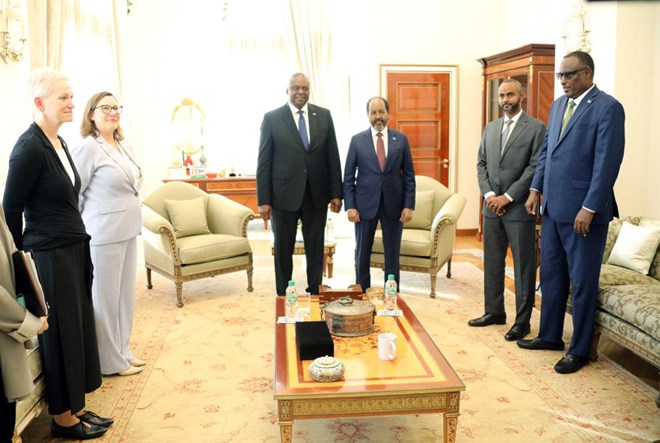
Monday September 25, 2023

DJIBOUTI — U.S. Secretary of Defense Lloyd Austin says Somali forces have made “impressive progress” in the fight against al-Shabab but cautioned that the terror group still can “export terror from ungoverned spaces.”
“I think they (Somali forces) made more progress in the last year than was made in the previous five years,” Austin told reporters in Djibouti.
Austin met with Somali President Hassan Sheikh Mohamud in Djibouti Sunday as part of his first visit to the African continent as defense secretary. Earlier, Austin met with the Djiboutian president and defense minister, thanking them for hosting the United States’ primary base in Africa and for supporting Somalia in its fight against extremist groups.
Somalia’s army and allied clan militias have continued to drive al-Shabab fighters out of central Somalia as part of the country’s military offensive since the president declared “total war” against the militants in August 2022.
But terrorists continue to strike at Somali forces, with a truck bombing near a security checkpoint in the central Somali town of Beledweyne killing 21 people and wounding 52 others Saturday. Security forces had been tipped off about the truck and were inspecting it when it detonated, Beledweyne District Omar Osman Alasow told VOA.
The meeting between Austin and Mohamud comes two days after a small arms fire attack on a military barracks in Kulbiyow, Somalia, left one U.S. contractor and a partner force member injured, a senior defense official told VOA.
A pro-al-Shabab outlet claimed the attack injured four U.S. forces and nine members of Kenya’s forces. The senior defense official told VOA that was "overblown,” adding that no U.S. service member was injured, and the contractor's injuries did not require medivac.
Recent violence has led Somali officials to seek a 90-day delay in the scheduled drawdown of African Union peacekeepers to account for what the Somali government calls “several significant setbacks.”
“He (President Mohamud) wants to do everything that he can to maintain momentum,” Austin said in response to VOA, without commenting further on the Somali request to the African Union.
Three thousand African Union forces are expected to withdraw from Somalia by the end of this month, with all African Union forces set to withdraw by the end of next year.
Pulling support for Somalia too early, or not devoting enough resources to countering Islamic extremists in Africa, could allow terror groups to overrun the country much like the Taliban did while the U.S. was withdrawing its military forces there, says Bill Roggio, a former soldier and editor of the Foundation for Defense of Democracies’ Long War Journal, which publishes reporting and analysis of global counterterrorism efforts.
“We're operating on the margins against these jihadist groups, barely keeping them contained,” Roggio told VOA. “
Wagner Group in Africa
Meanwhile, U.S. defense officials say the U.S. has not seen a withdrawal of a substantial number of Wagner Group forces following the death of its leader last month.
“Wagner still has a substantial presence on the continent,” Austin told reporters Sunday in Djibouti.
More than one month since Russian mercenary leader Yevgeny Prigozhin’s death, the U.S. has not yet seen a “decisive shift” in Wagner’s relationship with the Kremlin or signs that Moscow has absorbed the group’s operations across Africa, a senior defense official said.
“I think what you'll see in the future here is probably some competition within the ranks to (see) who's going to be the next leader,” Austin told reporters Sunday. “I think you'll also see potentially the Russian government moving to either replace Wagner with some other kind of element or using Russian forces to support efforts on the continent.”
Wagner forces will likely be able to sustain its presence in Africa in the near term, Austin added, but will struggle to do so in the mid- to long term without support from the Russian government.
One senior official told reporters that some governments have expressed regrets to U.S. officials after allowing Wagner to operate in their countries.
U.S. officials also said there have been signs of Wagner forces trying to “exploit” the political situation in Niger since military forces seized control and removed the president from power in July, without elaborating.
French President Emmanuel Macron announced Sunday that France will pull its ambassador out of the country and end its military presence in Niger by the end of the year. The military junta had repeatedly requested for the French ambassador to leave, saying France did not recognize the junta as the legitimate leaders of Niger.
The announcement is a significant hit to France’s policy in Africa. France had stationed thousands of troops in the Sahel region to fight jihadi groups in response to requests from state leaders, but French troops pulled out of neighboring Mali and Burkina Faso in recent years following coups there.
U.S. force posture in Niger has remained steady at about 1,000 forces since the junta took power in July, but the U.S. has moved some of its forces within Niger from a base in Niamey to a base in Agadez, about 1,000 kilometers (621 miles) from the capital.
Austin said the U.S. has not resumed counterterror operations with Niger’s military forces but has conducted intelligence, surveillance and reconnaissance missions to protect its forces from potential threats.
VOA’s Harun Maruf and Mohamed Olad Hassan contributed to this report.